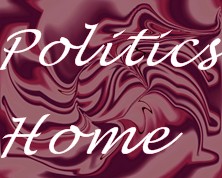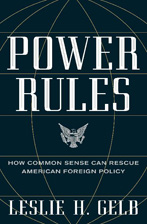
|
|
January 28, 2009 Power RulesI was reluctant to
write on this subject until I saw this book promotion on the website of the
Council on Foreign Relations.
As a matter of reference,
Leslie Gelb was the President of the Council on Foreign Relations during the Definition: Machiavellian 1 : of or relating
to Machiavelli or Machiavellianism 2 : suggesting the
principles of conduct laid down by Machiavelli; specifically : marked by cunning, duplicity, or bad
faith –Machiavellian noun Definition: Machiavellianism : the political theory of Machiavelli; especially
: the view that politics is amoral and that any means however
unscrupulous can justifiably be used in achieving political power. How have cunning,
duplicity, or bad faith been demonstrated in modern ·
Certainly
my treatment as an object of covert activities. ·
The
Democratic Coup of 2006. (refer related article) Generally the
subversion of our democracy by wealth and power should be explained in some
detail. The wealthy have always in all
cultures wielded a disproportionate amount of power under any ideology. Our constitution, however, promises us
better. Various factors beyond mere
human inclination have had their part too.
From the beginning of World War II, war powers necessitated a more
autocratic rule for protection from enemies.
That the Cold War followed without a break, continued the pretext for
war powers unknown to the public, even if unofficial. Parallel to these, the emergence of new
communications technologies forced the necessity that our rulers would have
to go to the wealthy to fund expensive radio and television advertising. The convergence of these factors enabled
the wealthy to grab the power that they always exercised to some degree. This bind was also comfortable to
politicians who, like most, would enjoy the benefits of the flow of wealth
that resulted. The last election saw
the flow of a lot of money. The
favored candidates initially received $11-15 million to fund their
campaigns. At the end, it is said that
McCain received $200 million in donations and Obama
$750 million. As an example of the
regard politicians have for their benefactors, when House Majority Leader Hastart spoke to his peers of a plot by Soros, Clinton, and Democratic operatives to steal the
2006 election, they acted quickly to enjoin his silence. It is perhaps suicide in politics to cross
with the supply of money. The 2008 election
brought stranger bedfellows. Oddly
enough, McCain is alleged to have received some of his donations from
Democratic benefactors. Donations from
Senator Kerry’s wife seem innocent enough considering their friendship, but
he received donations from Soros as well. Soros’ quest to
remove Bush seems after all to have been non-partisan. (You should know that there are a good many
more benefactors other than George Soros.) More light was
revealed during the Democratic primary, when two pundits attempted to explain
the apparently undemocratic inclusion of superdelegates
in the primary process. They said the
courts had little jurisdiction to determine primary political proceedings
because the political parties were non-governmental organizations
(NGOs). Research revealed that the
U.S. Constitution does not proscribe a primary process. The general election in November is the
only Constitutionally proscribed voting process for the election of the
President and his running mate. If
this is correct, the parties and their primaries could operate on any
principle whatsoever, even an undemocratic one, and under the control of any
group, even aspiring autocrats.
Certainly, this is an additional factor enabling despotism. The outcome is
that our vote buys us choices unimportant to the wealthy, those they defer to
us to preserve the illusion of democracy, leaving them in control of anything
of real value to them. During the
election the candidates did seem earnestly to contend for the position they
wanted. The question certainly
is: In the end, was the outcome the
result of deference to benefactors whom they could not possibly afford to
offend? This cries out of the betrayal
of the American people for the sake of expedience and wealth. Does anyone know who owns Obama? Niccolo Machiavelli profited politically from the
overthrow, by his benefactors the Medici family, of Girolamo
Savonarola, a virtuous saint of whom it was said that under his rule P.S. It would be naïve to think this only occurs in 1.
Council
on Foreign Relations, 2.
Merriam-Webster’s
11th Collegiate Dictionary. 3.
Encyclopedia
Britannica 2002, articles “Machiavelli, Niccolo”,
and “Savonarola, Girolamo.” |
|


